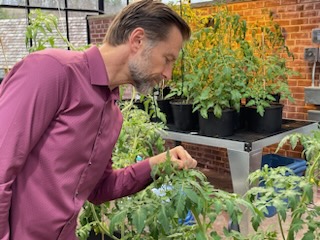Gardening is a fulfilling and rewarding hobby that allows individuals to cultivate their own little oasis of beauty and serenity. Whether you have a sprawling backyard or a small balcony, understanding the basics of gardening is essential for success. In this article, we will explore the fundamental elements of gardening, from soil preparation and plant selection to watering, fertilizing, and proper maintenance. By mastering these essential basics, you’ll be well on your way to creating a thriving and vibrant garden that brings joy and tranquility to your life.
Planning Your Garden:
Before getting your hands dirty, it’s important to start with a well-thought-out plan for your garden. Consider the available space, sunlight exposure, and your gardening goals. Determine whether you want to grow flowers, vegetables, herbs, or a combination of these. Sketch out a layout of your garden, taking into account factors such as plant spacing, pathways, and any specific design elements you want to incorporate. Planning ahead will help you make the most of your space, optimize plant growth, and create an aesthetically pleasing garden.
Preparing the Soil :
The quality of your soil is paramount to the success of your garden. Begin by clearing the area of any weeds or debris. Test the pH level of the soil to determine its acidity or alkalinity, as different plants have different soil pH preferences. Amend the soil with organic matter, such as compost or well-rotted manure, to improve its structure, fertility, and water-holding capacity. Work the amendments into the soil using a garden fork or tiller, ensuring they are thoroughly mixed. This will provide your plants with the necessary nutrients and a healthy growing environment.
Choosing the Right Plants :
Selecting the appropriate plants for your garden is crucial. Consider the climate and growing conditions in your area, as well as the amount of sunlight your garden receives. Research the specific requirements of each plant, such as water needs, spacing, and mature size. Choose plants that are well-suited to your garden’s conditions and your level of gardening experience. Beginners may find it helpful to start with easy-to-grow plants, such as herbs, leafy greens, or marigolds. As you gain confidence, you can gradually expand your plant selection and experiment with a wider variety of species.
Watering and Fertilizing :
Proper watering is essential for plant health and growth. Water your plants deeply and thoroughly, ensuring the water reaches the root zone. Avoid frequent shallow watering, as this can lead to shallow root growth. Monitor the moisture level of the soil and water when it feels dry to the touch, adjusting the frequency based on the weather conditions. In addition to watering, proper fertilization is important to provide essential nutrients to your plants. Choose a balanced fertilizer or organic alternatives, and follow the instructions for application rates and timing. Be mindful not to over-fertilize, as excessive nutrients can cause harm to your plants.
Maintaining Your Garden :
Regular maintenance is key to a thriving garden. Keep an eye out for weeds and remove them promptly to prevent competition for resources. Prune your plants as needed to promote healthy growth and shape. Deadhead flowers to encourage further blooming. Monitor your garden for pests or signs of disease, and take appropriate measures to address any issues. Regularly inspect your plants for nutrient deficiencies and adjust your fertilization routine accordingly. Stay attentive to the changing needs of your garden, and be prepared to adapt your care routine as required.
Learning and Growing :
Gardening is a continuous learning process. Stay curious and be open to new ideas and techniques. Read books, attend gardening workshops, and seek advice from experienced gardeners. Join gardening communities to share knowledge and experiences. Keep a garden journal to track your progress, noting successes and failures. Remember that not all plants will thrive, and that’s okay. Embrace the learning opportunities that come with gardening and use them to improve your skills and understanding of plants.
You can create a vibrant and flourishing garden space by understanding and applying gardening basics. Planning, soil preparation, plant selection, proper watering, and maintenance are essential for gardening success. Embrace the joys and challenges of gardening, and let your passion for growing plants lead you to a beautiful and thriving garden that brings you happiness and fulfillment. Happy gardening!

